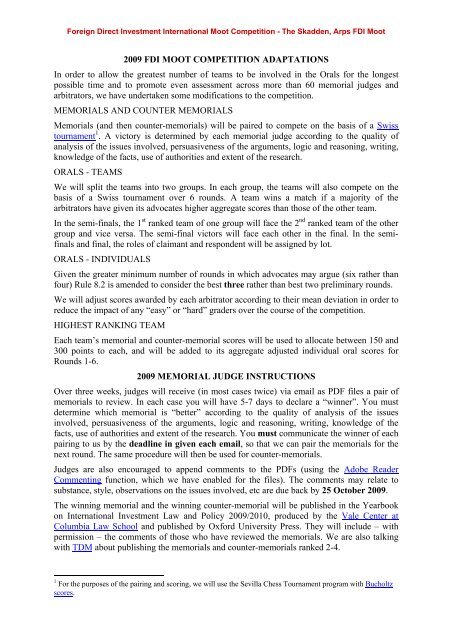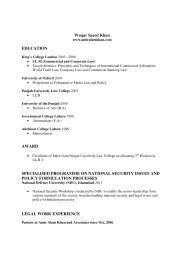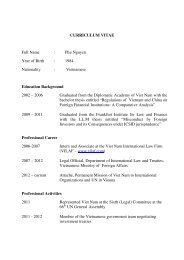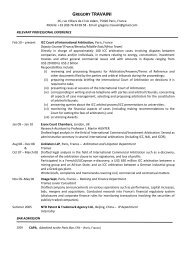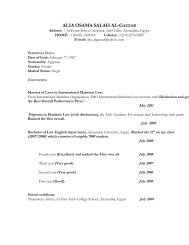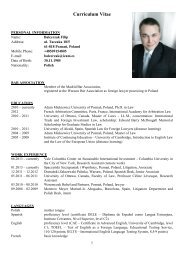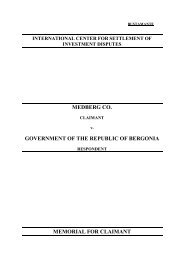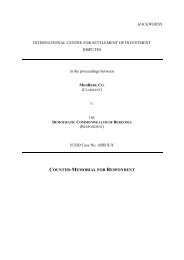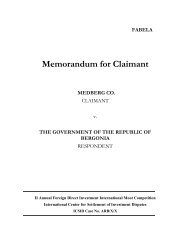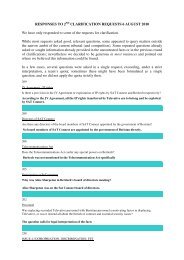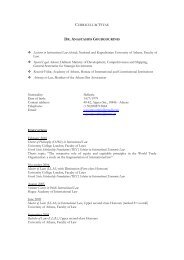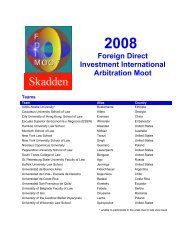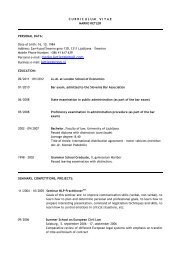Information on Mode of Competition - FDI Moot
Information on Mode of Competition - FDI Moot
Information on Mode of Competition - FDI Moot
You also want an ePaper? Increase the reach of your titles
YUMPU automatically turns print PDFs into web optimized ePapers that Google loves.
Foreign Direct Investment Internati<strong>on</strong>al <strong>Moot</strong> Competiti<strong>on</strong> - The Skadden, Arps <strong>FDI</strong> <strong>Moot</strong><br />
2009 <strong>FDI</strong> MOOT COMPETITION ADAPTATIONS<br />
In order to allow the greatest number <strong>of</strong> teams to be involved in the Orals for the l<strong>on</strong>gest<br />
possible time and to promote even assessment across more than 60 memorial judges and<br />
arbitrators, we have undertaken some modificati<strong>on</strong>s to the competiti<strong>on</strong>.<br />
MEMORIALS AND COUNTER MEMORIALS<br />
Memorials (and then counter-memorials) will be paired to compete <strong>on</strong> the basis <strong>of</strong> a Swiss<br />
tournament 1 . A victory is determined by each memorial judge according to the quality <strong>of</strong><br />
analysis <strong>of</strong> the issues involved, persuasiveness <strong>of</strong> the arguments, logic and reas<strong>on</strong>ing, writing,<br />
knowledge <strong>of</strong> the facts, use <strong>of</strong> authorities and extent <strong>of</strong> the research.<br />
ORALS - TEAMS<br />
We will split the teams into two groups. In each group, the teams will also compete <strong>on</strong> the<br />
basis <strong>of</strong> a Swiss tournament over 6 rounds. A team wins a match if a majority <strong>of</strong> the<br />
arbitrators have given its advocates higher aggregate scores than those <strong>of</strong> the other team.<br />
In the semi-finals, the 1 st ranked team <strong>of</strong> <strong>on</strong>e group will face the 2 nd ranked team <strong>of</strong> the other<br />
group and vice versa. The semi-final victors will face each other in the final. In the semifinals<br />
and final, the roles <strong>of</strong> claimant and resp<strong>on</strong>dent will be assigned by lot.<br />
ORALS - INDIVIDUALS<br />
Given the greater minimum number <strong>of</strong> rounds in which advocates may argue (six rather than<br />
four) Rule 8.2 is amended to c<strong>on</strong>sider the best three rather than best two preliminary rounds.<br />
We will adjust scores awarded by each arbitrator according to their mean deviati<strong>on</strong> in order to<br />
reduce the impact <strong>of</strong> any “easy” or “hard” graders over the course <strong>of</strong> the competiti<strong>on</strong>.<br />
HIGHEST RANKING TEAM<br />
Each team’s memorial and counter-memorial scores will be used to allocate between 150 and<br />
300 points to each, and will be added to its aggregate adjusted individual oral scores for<br />
Rounds 1-6.<br />
2009 MEMORIAL JUDGE INSTRUCTIONS<br />
Over three weeks, judges will receive (in most cases twice) via email as PDF files a pair <strong>of</strong><br />
memorials to review. In each case you will have 5-7 days to declare a “winner”. You must<br />
determine which memorial is “better” according to the quality <strong>of</strong> analysis <strong>of</strong> the issues<br />
involved, persuasiveness <strong>of</strong> the arguments, logic and reas<strong>on</strong>ing, writing, knowledge <strong>of</strong> the<br />
facts, use <strong>of</strong> authorities and extent <strong>of</strong> the research. You must communicate the winner <strong>of</strong> each<br />
pairing to us by the deadline in given each email, so that we can pair the memorials for the<br />
next round. The same procedure will then be used for counter-memorials.<br />
Judges are also encouraged to append comments to the PDFs (using the Adobe Reader<br />
Commenting functi<strong>on</strong>, which we have enabled for the files). The comments may relate to<br />
substance, style, observati<strong>on</strong>s <strong>on</strong> the issues involved, etc are due back by 25 October 2009.<br />
The winning memorial and the winning counter-memorial will be published in the Yearbook<br />
<strong>on</strong> Internati<strong>on</strong>al Investment Law and Policy 2009/2010, produced by the Vale Center at<br />
Columbia Law School and published by Oxford University Press. They will include – with<br />
permissi<strong>on</strong> – the comments <strong>of</strong> those who have reviewed the memorials. We are also talking<br />
with TDM about publishing the memorials and counter-memorials ranked 2-4.<br />
1 For the purposes <strong>of</strong> the pairing and scoring, we will use the Sevilla Chess Tournament program with Bucholtz<br />
scores.
Foreign Direct Investment Internati<strong>on</strong>al <strong>Moot</strong> Competiti<strong>on</strong> - The Skadden, Arps <strong>FDI</strong> <strong>Moot</strong><br />
GUIDELINES TO JUDGING ORAL ADVOCACY ARGUMENTS<br />
Thank you for agreeing to arbitrate oral rounds in this year's <strong>FDI</strong> <strong>Moot</strong>. We have prepared the<br />
following guide for the oral advocacy rounds before arbitrators. You may find that some <strong>of</strong><br />
these comments are comm<strong>on</strong> to moot competiti<strong>on</strong>s generally, while others are particular to<br />
the <strong>FDI</strong> <strong>Moot</strong>.<br />
I. WHO'S WHO IN AN <strong>FDI</strong> MOOT MATCH<br />
An oral match pits two teams against <strong>on</strong>e another, <strong>on</strong>e representing the Claimant and the other<br />
representing the Resp<strong>on</strong>dent (State). Each team c<strong>on</strong>sists <strong>of</strong> either <strong>on</strong>e or two oral advocates<br />
who will share the allotted time.<br />
You will be serving as a member <strong>of</strong> a three-member arbitral panel. The chief arbitrator, the<br />
"President", sits in the middle <strong>of</strong> the panel. The duties <strong>of</strong> the President are to: (1) signal when<br />
the oral advocates may begin or end their arguments; (2) al<strong>on</strong>g with the co-arbitrators to<br />
questi<strong>on</strong> the advocates; (3) to answer procedural questi<strong>on</strong>s by the advocates ("May I have <strong>on</strong>e<br />
minute extra time to finish my answer?"); and (4) generally maintain order in the proceedings.<br />
The ICSID arbitrati<strong>on</strong> rules envisage parties being represented by “agents, counsel or<br />
advocates”. Therefore, you may hear the advocates refer to "my Co-Counsel" or "the Agent<br />
for the Resp<strong>on</strong>dent." Arbitrators are addressed as "Mister/Madame Arbitrator or by their titles<br />
and surnames (available <strong>on</strong> the name plates), e.g. “Mr. Berger”, “Pr<strong>of</strong>. Loyola”. The President<br />
may be referred to as "Mister President" or "Madam President."<br />
The Secretary <strong>of</strong> the Tribunal will aid Arbitrators in the hearing room. Prior to the match, the<br />
Secretary obtains the correct spellings <strong>of</strong> the oral advocates names and each team's time<br />
allocati<strong>on</strong>. The Secretary records this informati<strong>on</strong> <strong>on</strong> the score sheets and transmits the<br />
paperwork to the arbitrators. At the beginning <strong>of</strong> the round, the secretary will usher the<br />
arbitrators into the hearing room, announcing the case and introducing each arbitrator. During<br />
the match, the Secretary must track how much time remains for each advocate’s argument and<br />
indicate this by holding up cards for the teams and the panel to see (“5 minutes”, “3 minutes”,<br />
“1 “STOP”, which indicates the advocate’s allotted time has expired).<br />
II. THE ORDER OF ARGUMENT<br />
Each team has 35 minutes to present its case. The team allocates its time am<strong>on</strong>g its first<br />
advocate, its sec<strong>on</strong>d advocate, and any rebuttal (or surrebuttal). Before arbitrators enter the<br />
hearing room, each team will have indicated to the Secretary how it wishes to divide the 35<br />
minutes am<strong>on</strong>g these parts, for which purpose teams must appear before the Secretary at least<br />
5 minutes before the hearing is scheduled to begin..<br />
• The team may announce its time allocati<strong>on</strong> to the panel at the outset <strong>of</strong> its argument.<br />
• The team need not determine ahead <strong>of</strong> time which advocate will deliver rebuttal or<br />
surrebuttal. This is <strong>of</strong>ten a strategic choice, made during the course <strong>of</strong> opposing counsels'<br />
arguments.<br />
The match begins with the President inviting counsel and the audience to be seated Hearings<br />
should be structured as flexibly as the teams may agree (or failing that) as the President<br />
directs, so l<strong>on</strong>g as basic procedural fairness is respected. The order <strong>of</strong> presentati<strong>on</strong> in an oral<br />
match might be, for example:<br />
Alternative 1 Alternative 2
Foreign Direct Investment Internati<strong>on</strong>al <strong>Moot</strong> Competiti<strong>on</strong> - The Skadden, Arps <strong>FDI</strong> <strong>Moot</strong><br />
1.Claimant <strong>on</strong> Admissibility/Jurisdicti<strong>on</strong><br />
2. Claimant <strong>on</strong> Merits<br />
3. Resp<strong>on</strong>dent <strong>on</strong> Admissibility/Jurisdicti<strong>on</strong><br />
4. Resp<strong>on</strong>dent <strong>on</strong> Merits<br />
3. Claimant's Rebuttal (unless waived)<br />
4. Resp<strong>on</strong>dent's Surrebuttal (unless waived)<br />
1. Resp<strong>on</strong>dent <strong>on</strong> Admissibility/Jurisdicti<strong>on</strong><br />
2. Claimant <strong>on</strong> Admissibility/Jurisdicti<strong>on</strong><br />
3. Claimant <strong>on</strong> Merits<br />
4. Resp<strong>on</strong>dent <strong>on</strong> Merits<br />
5. Claimant's Rebuttal (unless waived)<br />
6. Resp<strong>on</strong>dent's Surrebuttal (unless waived)<br />
Teams should discuss between each other before the tribunal enters, whether they can agree<br />
<strong>on</strong> an order. If an order is agreed, both teams should so indicate to the tribunal. If there is no<br />
agreement, each team may propose an order to the tribunal, but there will be no argument <strong>on</strong><br />
the matter, and the President shall decide how to proceed, accepting either team’s proposal or<br />
adopting his or her own alternative. In all cases, the order should be made clear to the<br />
Secretary so that he or she can keep time <strong>on</strong> the oralists. For the sake <strong>of</strong> the time-keeping, the<br />
tribunal should not permit a debate back and forth between the parties’ counsel.<br />
If Claimant waives rebuttal (which it may do by informing the panel when the time for<br />
rebuttal arises), then Resp<strong>on</strong>dent does not have an opportunity to exercise surrebuttal.<br />
At the end <strong>of</strong> the final argument, the Secretary will ask the Counsel and audience to rise and<br />
leave the room. The arbitrators will then begin deliberati<strong>on</strong>s (maximum 10 minutes).<br />
When the arbitrators have finished deliberating and have scored the match, the President will<br />
instruct the Secretary to bring the competitors and audience back into the hearing room. At<br />
this point, court is no l<strong>on</strong>ger formally in sessi<strong>on</strong>; arbitrators may give the advocates feedback<br />
<strong>on</strong> their performance (see below). Arbitrators must not give the teams substantive tips.<br />
If anything inappropriate happens during the match, the President should eliminate the<br />
disturbance without unduly influencing the flow <strong>of</strong> the match, and note this <strong>on</strong> his or her score<br />
sheet under “Comments”. The Secretary will notify the Administrator when submitting the<br />
score sheets. The Administrator will investigate and assess the appropriate penalties. Oralmatch<br />
misc<strong>on</strong>duct is uncomm<strong>on</strong>, but includes:<br />
• Team members at counsel table talking to (or receiving notes from) spectators. This is<br />
strictly forbidden. For this reas<strong>on</strong>, the use <strong>of</strong> laptops at counsel table is also prohibited.<br />
Without interrupting the advocate speaking, the President should instruct the team to stop the<br />
communicati<strong>on</strong>.<br />
• Spectators entering or leaving during the match. If repeated movement disturbs the match,<br />
adm<strong>on</strong>ish the audience to have respect for the advocates.<br />
• Team members leaving counsel table during the match. Inform the Secretary at the end <strong>of</strong><br />
the match.<br />
• Generally disruptive c<strong>on</strong>duct at counsel table. Instruct the team to have respect for the<br />
opposing counsel at the podium.<br />
III. THE ROLE OF THE ARBITRATOR<br />
Opini<strong>on</strong>s differ regarding the role <strong>of</strong> an arbitrator in a moot competiti<strong>on</strong>. One view is that an<br />
arbitrator should ensure that participants complete their entire presentati<strong>on</strong>. Another is that<br />
participants are truly tested <strong>on</strong>ly when a lively panel engages advocates in a dialogue.<br />
The best panels are able to find a balance between the two. Most observers agree that<br />
arbitrators should at least ask questi<strong>on</strong>s <strong>of</strong> a sufficient difficulty and in a sufficient quantity to<br />
prevent the competitors from merely reading a rehearsed speech. Participants have worked <strong>on</strong>
Foreign Direct Investment Internati<strong>on</strong>al <strong>Moot</strong> Competiti<strong>on</strong> - The Skadden, Arps <strong>FDI</strong> <strong>Moot</strong><br />
the <strong>FDI</strong> <strong>Moot</strong> Problem for several m<strong>on</strong>ths, and generally appreciate being tested <strong>on</strong> the<br />
material. At the same time, arbitrators should refrain from taking up too much time by asking<br />
l<strong>on</strong>g questi<strong>on</strong>s or making lengthy comments <strong>of</strong> their own.<br />
Arbitrators must not decide this case <strong>on</strong> the merits, but instead <strong>on</strong> the performances <strong>of</strong> the oral<br />
advocates. An arbitrator should evaluate the strength <strong>of</strong> each advocate's overall presentati<strong>on</strong>,<br />
the validity <strong>of</strong> the participants' arguments, the persuasiveness <strong>of</strong> their presentati<strong>on</strong>, their poise<br />
and advocacy skills, and the thoroughness <strong>of</strong> their preparati<strong>on</strong>. The score sheet outlines the<br />
criteria for the oral presentati<strong>on</strong>.<br />
Please note that oral advocates are not bound by their written arguments. Since written<br />
memorials were submitted, subsequent research (and subsequent oral rounds) may lead<br />
advocates to revise the substance, style and structure <strong>of</strong> their arguments.<br />
The oral advocates will assume that the arbitrators are generally familiar with the facts <strong>of</strong> the<br />
case. Therefore, advocates will likely not ask the tribunal if it wishes to hear a recitati<strong>on</strong> all<br />
the facts. Instead, advocates may focus <strong>on</strong>ly <strong>on</strong> those facts that are directly pertinent to their<br />
legal arguments.<br />
IV. HELPFUL HINTS FOR ARBITRATORS<br />
A. DURING THE MATCH:<br />
• Utilize c<strong>on</strong>cise questi<strong>on</strong>s that call for a “yes” or “no” answer. Such questi<strong>on</strong>s test an oral<br />
advocate's ability to answer directly and clarify the competitor’s positi<strong>on</strong> <strong>on</strong> an issue.<br />
• Feel free to ask “basic” questi<strong>on</strong>s, including the nature and sources <strong>of</strong> internati<strong>on</strong>al<br />
investment law. Such questi<strong>on</strong>s ensure that the advocate understands internati<strong>on</strong>al law and is<br />
not merely reciting memorized details.<br />
• Avoid asking rhetorical questi<strong>on</strong>s or making lengthy statements that use up the time <strong>of</strong> the<br />
participants.<br />
• Avoid lengthy debates with the advocates. Feel free to press for a direct answer, but avoid<br />
m<strong>on</strong>opolizing the advocate's time.<br />
• Questi<strong>on</strong> each advocate equally. Evaluating the match is easier when all advocates have<br />
been equally tested by the panel.<br />
• Avoid grilling an advocate about his/her teammate's argument. Each advocate should be<br />
generally familiar with the team's entire argument, but is not expected to have a detailed grasp<br />
<strong>of</strong> his/her co-counsel's argument. You may, however, explore inc<strong>on</strong>sistencies between the<br />
two.<br />
• Respect the time limits <strong>on</strong> oral argument. The President may generally grant an advocate<br />
extra time solely for answering a specific questi<strong>on</strong> or briefly c<strong>on</strong>cluding the presentati<strong>on</strong>.<br />
• Many competitors are not native English speakers; if you determine that an advocate is not a<br />
native speaker, it may be useful to avoid asking l<strong>on</strong>g, complicated questi<strong>on</strong>s.<br />
• Remember that teams come from different countries with a wide variety <strong>of</strong> legal resources.<br />
Some teams are at a disadvantage in this respect. The <strong>FDI</strong> <strong>Moot</strong> issues are intended to be<br />
answerable by reference to generally available materials and a careful reading <strong>of</strong> the facts.<br />
B. AFTER THE ORAL MATCH - DELIBERATIONS:<br />
At the end <strong>of</strong> the match after the competitors and audience have left the room, arbitrators may<br />
begin deliberating. Some arbitrators prefer to discuss the match with the other arbitrators,<br />
while others do not wish to be “influenced”. Either approach is acceptable. Please do not<br />
deliberate more than 10 minutes and remember:
Foreign Direct Investment Internati<strong>on</strong>al <strong>Moot</strong> Competiti<strong>on</strong> - The Skadden, Arps <strong>FDI</strong> <strong>Moot</strong><br />
• Reas<strong>on</strong>able arbitrators disagree. D<strong>on</strong>'t worry if you score the match c<strong>on</strong>siderably differently<br />
than the other arbitrators. “Split panels” are a comm<strong>on</strong> outcome in practice and in moot<br />
competiti<strong>on</strong>s.<br />
• You al<strong>on</strong>e are resp<strong>on</strong>sible for your score. While discussi<strong>on</strong>s am<strong>on</strong>g arbitrators may be<br />
useful, do not feel pressured to adjust your scores to match those <strong>of</strong> the others.<br />
• Do not speak about the merits <strong>of</strong> the case (or the results <strong>of</strong> the match) <strong>on</strong>ce the competitors<br />
re-enter the room, as they may try to interpret comments made by the arbitrators.<br />
C. AFTER THE ORAL MATCH - ARBITRATORS' COMMENTS TO THE TEAMS:<br />
After the score sheets have been given to the Secretary, the Secretary will ask the advocates<br />
and spectators to return to the room, and deliver the score sheets immediately to the<br />
Administrator. Meanwhile, arbitrators may give feedback to the oral advocates. Generally, it<br />
is nice to preface comments with a brief introducti<strong>on</strong> by each arbitrator as to his or her<br />
background (i.e., any arbitrati<strong>on</strong>, internati<strong>on</strong>al law, and current job). Please observe the<br />
following rules:<br />
• Do not announce the winner <strong>of</strong> a match or the scores <strong>of</strong> advocates.<br />
• Do not give substantive comments to the competitors or suggest alternative arguments to the<br />
teams. Substantive advice gives the teams before you an unfair advantage over other teams.<br />
You may comment <strong>on</strong> an advocate’s poise, the structure <strong>of</strong> his/her argument, and other<br />
general tips <strong>on</strong> oral advocacy.<br />
• Do not ask the advocates which school or which country they represent. Oral arguments are<br />
an<strong>on</strong>ymous. Even if you are not scheduled to arbitrate again, others may overhear the answer.<br />
At the end <strong>of</strong> the <strong>FDI</strong> <strong>Moot</strong>, you may ask the Administrator.<br />
• Please keep your comments brief (in total under 10 minutes). The <strong>FDI</strong> <strong>Moot</strong> is run <strong>on</strong> a tight<br />
timetable. Students may need to argue shortly after the match, the Administrator will need the<br />
room and the arbitrators for another match.<br />
• C<strong>on</strong>flicting comments from different arbitrators may c<strong>on</strong>fuse oral advocates; remind the<br />
advocates that there are many different opini<strong>on</strong>s regarding oral presentati<strong>on</strong> styles. Avoid<br />
categorical statements regarding argument style.<br />
• Do not opine that the problem is unbalanced or that <strong>on</strong>e side is “correct”, as it may give the<br />
advocates the false impressi<strong>on</strong> that you favored the advocates arguing the more meritorious<br />
side. The point <strong>of</strong> the <strong>FDI</strong> <strong>Moot</strong> is not to determine which side <strong>of</strong> the argument is more<br />
meritorious.<br />
• Never c<strong>on</strong>fess ignorance <strong>of</strong> the subject matter <strong>of</strong> the problem. Instead, compliment the<br />
advocates <strong>on</strong> their preparati<strong>on</strong>.
Foreign Direct Investment Internati<strong>on</strong>al <strong>Moot</strong> Competiti<strong>on</strong> - The Skadden, Arps <strong>FDI</strong> <strong>Moot</strong><br />
MANDATORY ORAL PLEADING SCORE SHEET<br />
Arbitrator Name: __________________________________________________________________*<br />
Room (1-17) No.: _____________*<br />
Round (1-6; Semi-final; Final): ___________________*<br />
Name <strong>of</strong> Secretary: _________________________________________________________________*<br />
ARBITRATOR INSTRUCTIONS:<br />
Each oral advocate should be given a score between 25 (lowest) and 50 (highest) to reflect his/her performance<br />
during the oral argument. In particular, in assessing each advocate, you should take into account his/her:<br />
(1) knowledge <strong>of</strong> law (approximately worth 30% <strong>of</strong> each advocate’s score);<br />
(2) applicati<strong>on</strong> <strong>of</strong> law to the facts (approximately worth 25% <strong>of</strong> each advocate’s score);<br />
(3) ingenuity and ability to answer questi<strong>on</strong>s (approximately worth 30% <strong>of</strong> each advocate’s score);<br />
(4) style, poise, courtesy and demeanour (approximately worth 10% <strong>of</strong> each advocate’s score); and<br />
(5) time management and organizati<strong>on</strong> (approximately worth 5% <strong>of</strong> each advocate’s score).<br />
There are two opti<strong>on</strong>al worksheets attached to this mandatory score sheet in case you would like to breakdown<br />
your scores using the above criteria or provide additi<strong>on</strong>al written comments.<br />
An excellent advocate, who you think is likely am<strong>on</strong>g the top 10% <strong>of</strong> all the advocates in the competiti<strong>on</strong>, should<br />
be given a score between 46 and 50 points.<br />
A very good advocate, who you think is likely am<strong>on</strong>g the top 25% to 10% <strong>of</strong> all advocates in the competiti<strong>on</strong>,<br />
should be given a score between 41 and 45 points.<br />
A good advocate, who you think is likely in the top 50% to 25% <strong>of</strong> all advocates in the competiti<strong>on</strong>, should be<br />
given a score between 36 and 40 points.<br />
An adequate advocate, who you think likely to be am<strong>on</strong>g the top 75% to 50% <strong>of</strong> all advocates in the competiti<strong>on</strong>,<br />
should be given a score between 31 and 35 points.<br />
A poor advocate, who you think is likely in the bottom 25% <strong>of</strong> all the advocates in the competiti<strong>on</strong>, should be<br />
given a score between 25 and 30 points.<br />
CLAIMANT TEAM:<br />
1 st Claimant Advocate Score 25-50**<br />
RESPONDENT TEAM:<br />
1 st Resp<strong>on</strong>dent Advocate Score 25-50**<br />
L A S T N A M E, F i r s t N a m e*<br />
2 nd Claimant Advocate Score 25-50**<br />
L A S T N A M E, F i r s t N a m e*<br />
2 nd Resp<strong>on</strong>dent Advocate Score 25-50**<br />
L A S T N A M E, F i r s t N a m e*<br />
Comments<br />
L A S T N A M E, F i r s t N a m e*<br />
Comments<br />
Arbitrator Signature:______________________________________________ (score cannot be validated<br />
without signature)**<br />
* Secretary may fill in ** Only arbitrator may fill in
Foreign Direct Investment Internati<strong>on</strong>al <strong>Moot</strong> Competiti<strong>on</strong> - The Skadden, Arps <strong>FDI</strong> <strong>Moot</strong><br />
1. Enter the competitors<br />
<strong>FDI</strong> MOOT SECRETARY’S WORKSHEET<br />
2. Ask each team (the Claimant and the Resp<strong>on</strong>dent) how many minutes each competitor<br />
would like to reserve for her or his argument and rebuttal/surrebuttal. Record these times in<br />
the boxes numbered 1, 2 & 3 below.<br />
3. When the competitor begins to argue, note the time <strong>on</strong> your watch. (ie, 9:42)<br />
4. Calculate at what time you must hold up the 5 minute, 3 minute, 1 minute and Stop signs.<br />
(ie, if the competitor reserve 27 minutes for argument, and he starts at 9:42, you would fill in<br />
“10:04” in the “5 minutes left” box, “10:07” in the “3 minutes left box” , etc… (see the<br />
examples below).<br />
5. When the watch reaches the designated time, hold up the sign.<br />
Room (1-17) No.: _____________<br />
Round (1-6; Semi-final; Final): ___________________<br />
Name <strong>of</strong> Secretary: ___________________________________________________________<br />
FIRST CLAIMANT<br />
1. Argument Time Reserved (minutes):<br />
(ie, 27 minutes)<br />
Start Time <strong>on</strong> Watch:<br />
(ie, 9:42)<br />
5 Minutes Left<br />
(ie, 10:04)<br />
3 Minutes Left<br />
(ie, 10:05)<br />
1 Minute Left<br />
(ie, 10:08)<br />
Stop Time <strong>on</strong> Watch:<br />
(ie, 10:09)<br />
SECOND CLAIMANT<br />
FIRST RESPONDENT<br />
1. Argument Time Reserved (minutes):<br />
Start Time <strong>on</strong> Watch:<br />
5 Minutes Left<br />
3 Minutes Left<br />
1 Minute Left<br />
Stop Time <strong>on</strong> Watch:<br />
SECOND RESPONDENT<br />
2. Argument Time Reserved (minutes): 2. Argument Time Reserved (minutes):<br />
Start Time <strong>on</strong> Watch:<br />
Start Time <strong>on</strong> Watch:<br />
5 Minutes Left 5 Minutes Left<br />
3 Minutes Left 3 Minutes Left<br />
1 Minute Left 1 Minute Left<br />
Stop Time <strong>on</strong> Watch:<br />
REBUTTAL/SURREBUTTAL<br />
Stop Time <strong>on</strong> Watch:<br />
REBUTTAL/ SURREBUTTAL<br />
3. Rebuttal Time Reserved (minutes) 3. Rebuttal Time Reserved (minutes)<br />
Start Time <strong>on</strong> Watch:<br />
Start Time <strong>on</strong> Watch:<br />
3 Minutes Left: 3 Minutes Left:<br />
1 Minute Left: 1 Minute Left:<br />
Stop Time <strong>on</strong> Watch:<br />
Stop Time <strong>on</strong> Watch:


